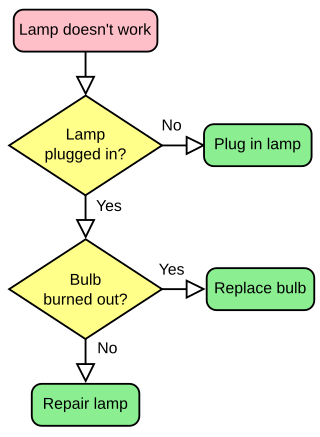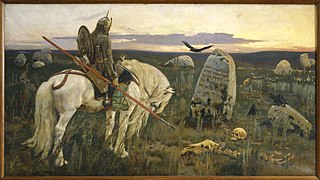
Artificial intelligence (AI) is the intelligence of machines or software, as opposed to the intelligence of human beings or animals. AI applications include advanced web search engines, recommendation systems, understanding human speech, self-driving cars, generative or creative tools, and competing at the highest level in strategic games.

In law, common law is the body of law created by judges and similar quasi-judicial tribunals by virtue of being stated in written opinions.

Finance is the study and discipline of money, currency and capital assets. It is related to, but not synonymous with economics, which is the study of production, distribution, and consumption of money, assets, goods and services . Finance activities take place in financial systems at various scopes, thus the field can be roughly divided into personal, corporate, and public finance.
Precedent or stare decisis is a principle or rule established in a previous legal case relevant to a court or other tribunal when deciding subsequent cases with similar issues or facts. Common-law legal systems often view precedent as binding or persuasive, while civil law systems do not. Common-law systems aim for similar facts to yield similar and predictable outcomes, and observing precedent when making decisions is the mechanism to achieve that goal. Common-law precedent is a third kind of law, on equal footing with statutory law and subordinate legislation in UK parlance – or regulatory law. The principle by which judges are bound to precedents is known as stare decisis.
A chief executive officer (CEO) is the highest officer charged with the management of an organization – especially a company or nonprofit institution.
A heuristic, or heuristic technique, is any approach to problem solving or self-discovery that employs a practical method that is not guaranteed to be optimal, perfect, or rational, but is nevertheless sufficient for reaching an immediate, short-term goal or approximation. Where finding an optimal solution is impossible or impractical, heuristic methods can be used to speed up the process of finding a satisfactory solution. Heuristics can be mental shortcuts that ease the cognitive load of making a decision.
In law, certiorari is a court process to seek judicial review of a decision of a lower court or government agency. Certiorari comes from the name of an English prerogative writ, issued by a superior court to direct that the record of the lower court be sent to the superior court for review. The term is Latin for "to be made certain", and comes from the opening line of such writs, which traditionally began with the Latin words "Certiorari volumus...".

Consensus decision-making or consensus process are group decision-making processes in which participants develop and decide on proposals with the aim, or requirement, of acceptance by all. The focus on establishing agreement of at least the majority or the supermajority and avoiding unproductive opinion differentiates consensus from unanimity, which requires all participants to support a decision.
Business intelligence (BI) comprises the strategies and technologies used by enterprises for the data analysis and management of business information. Common functions of business intelligence technologies include reporting, online analytical processing, analytics, dashboard development, data mining, process mining, complex event processing, business performance management, benchmarking, text mining, predictive analytics, and prescriptive analytics.
Case law, also used interchangeably with common law, is law that is based on precedents, that is the judicial decisions from previous cases, rather than law based on constitutions, statutes, or regulations. Case law uses the detailed facts of a legal case that have been resolved by courts or similar tribunals. These past decisions are called "case law", or precedent. Stare decisis—a Latin phrase meaning "let the decision stand"—is the principle by which judges are bound to such past decisions, drawing on established judicial authority to formulate their positions.

A decision tree is a decision support hierarchical model that uses a tree-like model of decisions and their possible consequences, including chance event outcomes, resource costs, and utility. It is one way to display an algorithm that only contains conditional control statements.

In psychology, decision-making is regarded as the cognitive process resulting in the selection of a belief or a course of action among several possible alternative options. It could be either rational or irrational. The decision-making process is a reasoning process based on assumptions of values, preferences and beliefs of the decision-maker. Every decision-making process produces a final choice, which may or may not prompt action.

Case citation is a system used by legal professionals to identify past court case decisions, either in series of books called reporters or law reports, or in a neutral style that identifies a decision regardless of where it is reported. Case citations are formatted differently in different jurisdictions, but generally contain the same key information.
In mathematical optimization and decision theory, a loss function or cost function is a function that maps an event or values of one or more variables onto a real number intuitively representing some "cost" associated with the event. An optimization problem seeks to minimize a loss function. An objective function is either a loss function or its opposite, in which case it is to be maximized. The loss function could include terms from several levels of the hierarchy.

Decision theory is a branch of applied probability theory and analytic philosophy concerned with the theory of making decisions based on assigning probabilities to various factors and assigning numerical consequences to the outcome.

A decision support system (DSS) is an information system that supports business or organizational decision-making activities. DSSs serve the management, operations and planning levels of an organization and help people make decisions about problems that may be rapidly changing and not easily specified in advance—i.e. unstructured and semi-structured decision problems. Decision support systems can be either fully computerized or human-powered, or a combination of both.

Decision tree learning is a supervised learning approach used in statistics, data mining and machine learning. In this formalism, a classification or regression decision tree is used as a predictive model to draw conclusions about a set of observations.

Sport pertains to any form of physical activity or game, often competitive and organized, that aims to use, maintain, or improve physical ability and skills while providing enjoyment to participants and, in some cases, entertainment to spectators. Sports can, through casual or organized participation, improve participants' physical health. Hundreds of sports exist, from those between single contestants, through to those with hundreds of simultaneous participants, either in teams or competing as individuals. In certain sports such as racing, many contestants may compete, simultaneously or consecutively, with one winner; in others, the contest is between two sides, each attempting to exceed the other. Some sports allow a "tie" or "draw", in which there is no single winner; others provide tie-breaking methods to ensure one winner and one loser. A number of contests may be arranged in a tournament producing a champion. Many sports leagues make an annual champion by arranging games in a regular sports season, followed in some cases by playoffs.
Markstrat is a simulation video game developed by Jean-Claude Larréché and Professor Hubert Gatignon, in which players take control of a virtual corporation. Players make a number of decisions in marketing, finance, research and development, and other areas in order to achieve a better performance than competing players, who also take control of their own companies. After the game was developed it was distributed on an ad-hoc basis by the French business school INSEAD. Markstrat is played in over 500 academic institutions worldwide, including 8 of the top 10 international business schools.











